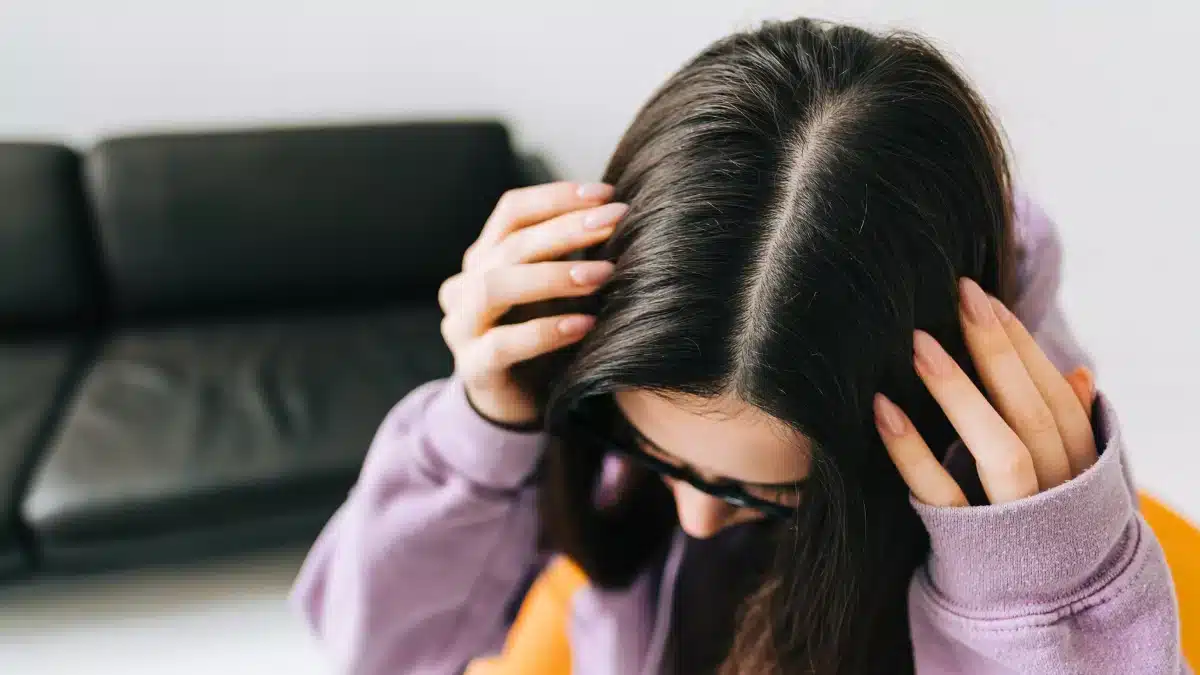Understanding Why is my Scalp Tender in one Spot: Causes and Solutions
Have you ever experienced tenderness or sensitivity in a particular portion of your scalp?
This localized discomfort may be confusing and concerning.
There could be several reasons behind the tenderness of your scalp in one spot.
This article will help you discover the possible causes of scalp tenderness in a single spot and discover practical solutions to alleviate soreness.
So let’s deep dive into the topic so that you can find answers to questions like, “Why is my scalp tender in one spot?”
Causes
You could face scalp tenderness in one spot for numerous reasons.
Some of the prominent causes include,
Scalp infection

Conditions like Scalp folliculitis, Seborrheic dermatitis, or Psoriasis can cause infection.
As a result, this leads to scalp tenderness in one spot.
Nerve irritation
Pinched or irritated scalp nerves can bring localized tenderness and aches.
If you have hair loss that has caused scars that run deep, the scars may have damaged your nerves.
Trauma or injury
Previous injuries, a bump or scratch, can enhance tenderness within the affected area.
Intense scratching can also cause breaks in the skin and sores that may lead to scabs.
Skin infections
Bacterial or fungal infections and cellulitis or ringworm can cause spot tenderness.
Anxiety or muscle pressure
Immoderate muscle anxiety or pressure on your neck or scalp muscle groups can cause tenderness and soreness in specific regions.
Effective solutions
With the right approach and treatment options, you can reduce scalp tenderness.
Here are a few of the available solutions.
Right scalp hygiene
Over time, you might develop several scalp conditions.
Retaining an easy and wholesome scalp through regular shampooing and mild exfoliation can assist in alleviating tenderness.
Topical remedies

To provide alleviation and promote healing, your dermatologist recommends,
- Creams
- Ointments
- Medicated shampoos
- Treating the underlying cause
Stress management
Working towards stress-reducing techniques can help alleviate anxiety and muscle strain.
These include meditation, deep respiratory physical activities, or accomplishing relaxing sports.
Pain relief measures
Pain relievers, consisting of Ibuprofen or Acetaminophen, can temporarily alleviate scalp tenderness.
It’s critical to seek advice from a healthcare professional before taking any medications.
Seeking medical advice
If scalp tenderness persists or is observed by means of different concerning signs, it is recommended to consult a dermatologist or healthcare provider.
They will help you with a proper prognosis and personalized remedy plan.
Prevention

It is not possible to maintain your scalp tenderness every time.
However, adopting positive practices can help hold a healthy scalp and minimize the chance of scalp pain in a single spot.
- Practice good scalp hygiene – You should often cleanse your scalp with a mild shampoo and keep away from excessive use of styling merchandise. These products can block the hair follicles and contribute to scalp issues.
- Avoid scratching – Avoid scratching your scalp vigorously, as it might cause irritation and potential damage to the pores and skin. As a result, they are increasing the danger of scalp tenderness.
- Protect from sun exposure – You should defend your scalp from excessive sun exposure by either carrying a hat or using sunscreen. These measures can save you from sunburn and scalp tenderness.
- Manage stress – Implementing stress management strategies to lessen scalp pressure levels is crucial. You can include exercises or meditations to reduce scalp tension and discomfort.
- Avoid harsh hairstyles – Avoid any hairstyles that put undue stress on the scalp, as this might cause soreness in specific areas.
Incorporating these preventive measures into your routine can help promote a healthy scalp.
You can also limit the probability of experiencing tenderness in a single spot.
Conclusion
Experiencing tenderness in a single spot on your scalp may be uncomfortable and problematic.
Scalp infection, trauma, anxiety, or muscle pressure could be responsible for scalp tenderness at one spot.
By understanding the possible causes and implementing potential solutions, you can find comfort and promote scalp health.
To receive a proper diagnosis and course of treatment, always seek the advice of a medical professional.
If you take preventative measures to treat your scalp, you should be able to experience relief from discomfort and suffering in the near future.
Frequently Asked Questions
What do tender spots on the head mean?
Tender spots on the head may have different meanings, such as scalp inflammation, tension headaches, nerve irritation, or skin conditions. It’s advisable to seek medical advice for an accurate diagnosis and appropriate treatment.
What is it called when your scalp is tender?
Scalp tenderness, also known as the sensitive scalp, refers to when your scalp feels tender or sensitive to touch. Different factors, including inflammation, infection, or underlying conditions, can cause it. Seeking medical advice is advised for accurate diagnosis and appropriate treatment.
Why does a spot on my scalp hurt to touch?
Experiencing discomfort or tenderness when touching a spot on your scalp can be attributed to different factors, including inflammation, infection, or heightened nerve sensitivity. A healthcare professional is advised to identify the underlying cause and seek suitable treatment for relief.
Can a brain tumor cause scalp tenderness?
Multiple factors, such as tension headaches, migraines, or scalp inflammation, can cause scalp tenderness. While brain tumors can cause symptoms, they typically don’t directly result in scalp tenderness. Consult a medical expert for an accurate diagnosis and suitable treatment options.
WowRx uses only high-quality sources while writing our articles. Please read our content information policy to know more about how we keep our content reliable and trustworthy.






